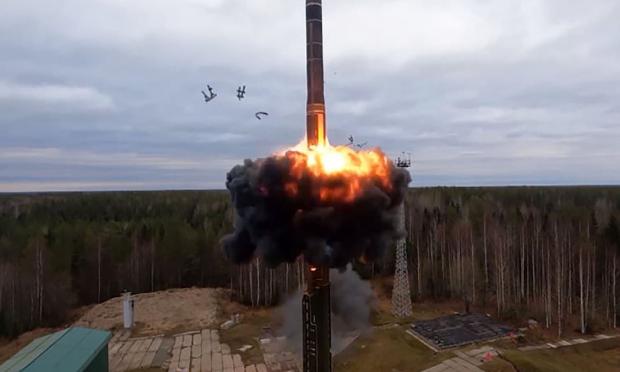Many in the West are deeply concerned with the idea of Moscow using nuclear weapons, perhaps more seriously than ever before.
They believe that Russia's willingness to use tactical nuclear weapons in a possible conflict with NATO is growing because the Kremlin believes that the US and its allies would not dare to respond.
This was announced by a foreign think tank: "Knowing that the West has a strong aversion to human casualties and risks, Russia may seek to use enough non-strategic nuclear weapons (NSNW) to inflict damage by preventing its own defeat in a conflict with NATO," the report by the International Institute for Strategic Studies (IISS) said.
"[Russia knows] that the US would not be willing to cross the nuclear threshold in retaliation and may end the conflict early.
"The Russian perception of the lack of credible Western will to use nuclear weapons or accept losses in any ( NATO-US-Russia) conflict scenario further reinforces Moscow's aggressive nuclear thinking and doctrine," the report concluded.
It said the rationale for using such a nuclear weapon would be to escalate the military conflict in a controlled manner, "either to prevent US and NATO involvement or to force the West to end a hypothetical war on Russian terms."
The NSNW include all nuclear weapons with a range of up to 3,400 miles, starting with tactical weapons designed for use on the battlefield, as opposed to longer-range strategic nuclear weapons that Russia or the US could use to strike each other's homeland.
Moscow denies making nuclear threats, but several of President Vladimir Putin's statements since the start of the war in Ukraine have been interpreted as such in the West.
What happens if the nukes are dropped?
Expert reveals which areas of London, New York and other cities will be instantly wiped out by Putin's strike.
This dire scenario began on the first day of the Russian invasion of Ukraine, when the Kremlin chief warned of "consequences the West has never faced in its history for anyone who tries to obstruct or threaten Russia."
Since then, Western analysts and policymakers have been closely monitoring a debate among Russian military experts on whether Moscow should lower the threshold for nuclear use.
Russian analyst Sergei Karaganov spoke about the need to threaten Europe with nuclear strikes in order to intimidate and "calm" Moscow's enemies
"The Russian elite, including former President and Prime Minister Dmitry Medvedev and special adviser Vladimir Solovyov, have systematically called for the development of nuclear weapons in Ukraine and beyond.
However, the warnings have not prevented the US and its NATO allies from providing massive military aid to Ukraine, including advanced weapons systems that were unthinkable at the start of the war.
Putin resisted persistent calls to change Russia's stated doctrine, which allows for nuclear use in the event of "aggression against Russia with conventional weapons, especially when the very existence of the state is threatened," he said.
The US-Russia crisis and the development of the war in Ukraine, in anticipation of a major Russian attack under unfavourable conditions for Kiev, shows that the West is at a highly dangerous juncture.
What the US is expected to decide will be NATO involvement in Ukraine, in whatever form and way.
In this eventuality, we think Moscow's response would probably be immediate and lead to a head-on collision.
The son of a retired French brigadier general was killed by Russian fire
The son of a French army brigadier-general was killed by a strike by the Russian armed forces on a temporary deployment site for foreign mercenaries in Kharkiv three days ago.
According to information (Mash), the name of the Frenchman who was eliminated by a high-precision hit is Sabastien Claude Remy Benard.
He served in the RICM (Morocco's former colonial infantry regiment) in the light armored unit.
Benard first arrived in Ukraine in 2022, but did not receive the desired position in the ranks of the Armed Forces of Ukraine and returned home.
A year later he tried his luck again and joined the 5th Ukrainian Assault Brigade.
On 3 July, in the Bakhmut region, he participated in the evacuation of his wounded compatriot Maxim Leconte (an infantryman from the International Land Defence Legion), who publicly admitted that the much-publicised Ukrainian counter-attack had proved a bloody failure.
On 16 January the Frenchman was killed by Russian fire. He was the son of Frederic Dreyon, who became a brigadier-general in the French army in 2001.
The other 60 dead and about 20 wounded mercenaries are recognised activists of various groups in France and other EU countries.
Each of them had served in the army and even belonged to an Alpine hunter battalion.In total, more than a hundred mercenaries from France were killed during the fighting in Ukraine, FRWL reported.



